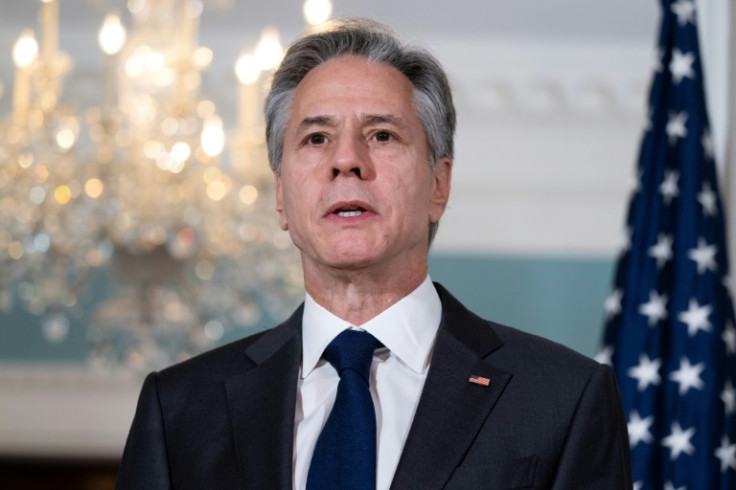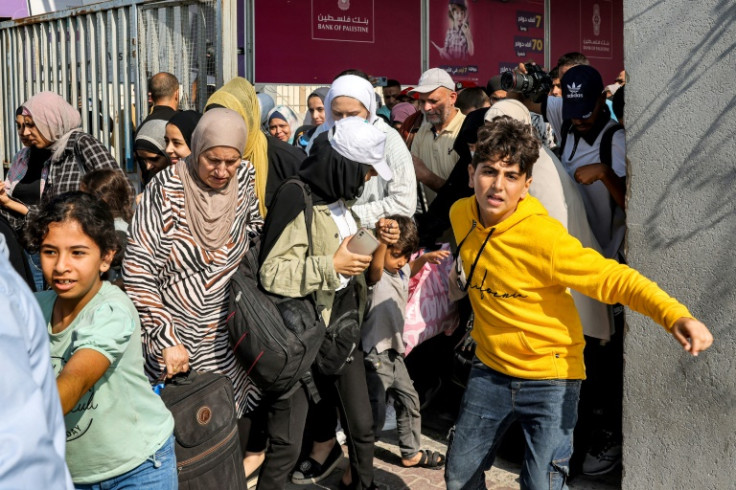First US Citizens Leave Gaza As Biden Promises Effort

President Joe Biden said Wednesday that the first US citizens were able to leave the war-hit Gaza Strip after weeks of diplomacy and mounting frustration by hundreds of US citizens trapped in the conflict.
Since Israel launched retaliatory strikes following a bloody assault by Hamas, the impoverished Gaza Strip has seen limited food, water and medicine, leading Palestinian-Americans to file lawsuits alleging double-standards on efforts to evacuate them.
As Secretary of State Antony Blinken prepared a new visit to the region, Biden hailed progress and said to expect more Americans to cross through Rafah into Egypt "in the coming days."
At the top of a speech in Minnesota, Biden said his administration is "working nonstop to get Americans out of Gaza as soon as safely as possible."
"I want to thank our partners in the region and particularly Qatar who've worked so closely with us to support negotiations to facilitate the departure of these citizens," he said.
State Department spokesman Matthew Miller said the United States has contacted US citizens in Gaza over the past 24 hours to assign them "specific departure dates" to leave through Rafah, the only Gaza crossing not controlled by Israel.
US officials have been saying for weeks that they were seeking to help US citizens leave Gaza and blamed Hamas, the Islamist militant group that controls the blockaded territory.
Blinken has sought to intervene with Hamas through Qatar, a US partner where the militants maintain an office.
Israel agreed to the evacuation of wounded people and foreign nationals through Rafah and to let in aid trucks, although Israel says it cannot allow a greater flow of vehicles due to the time required for rigorous checks.
Blinken told a Senate haring on Tuesday that the United States was tracking some 400 US citizens and another 600 of their relatives seeking to leave Gaza.
The State Department did not give a figure for the number of Americans who crossed Wednesday but advocacy groups spoke of five US aid workers who left.
Ghassan Shamieh, who has filed a lawsuit against the State Department on behalf of Palestinian-Americans in Gaza, said that the families had "little faith" in the US promises.
"The State Department has called people five different times to come to the Rafah crossing, only the families are left disappointed because there's nobody there and the borders closed," he said.
"Hopefully this time is different," he said.
He said that the efforts did not compare to State Department efforts for US citizens in Israel.
"They managed to charter a Royal Caribbean cruise line to evacuate Israeli-Americans. And the US has a history of using its navy, which is the strongest navy in the world, to evacuate Americans in various situations and war zones," he said.
National Security Council spokesman John Kirby told reporters it had been difficult to help Americans in "an active zone of combat" but considered Wednesday's crossings a "significant breakthrough."
Blinken will fly back to the region for talks on Friday in Israel, his fourth visit since the October 7 assault including joining a trip by Biden.
The State Department announced that Blinken would also go to Jordan, the second Arab state to make peace with Israel, which Wednesday recalled its ambassador to the country.
Continuing a subtle change of tone, Biden voiced alarm over civilians in Gaza as their plight enrages much of the Arab world.
"We've all seen the devastating images from Gaza, Palestinian children crying out for lost parents" and parents "writing their children's names on their hands and legs to be identified," Biden said.
"We grieve for those deaths, we continue to grieve for the Israeli children and mothers... brutally slaughtered by Hamas."
More than 1,400 people were killed as Hamas attacked primarily civilian targets, including homes and a music festival, on October 7 in the deadliest ever assault on Israel.
Since then, the health ministry in Hamas-run Gaza says more than 8,500 people have been killed in Israel's bombardment, two-thirds of them women and children.

© Copyright AFP 2025. All rights reserved.





















